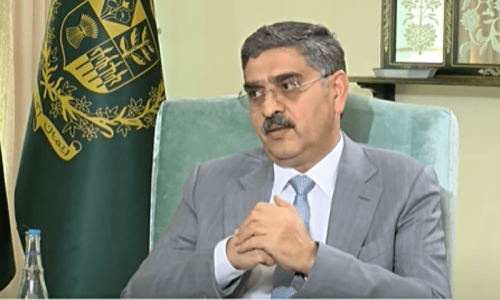IS it possible to hold ‘free and fair’ elections with a widely popular political leader facing disqualification by the courts? Should such an election be morally acceptable? And can a government formed through such an election ever make a legitimate claim on the public’s mandate?
In a country as full of internal contradictions as Pakistan, there are no easy answers to these questions.
Caretaker Prime Minister Anwaarul Haq Kakar recently made a statement suggesting that ‘free and fair’ elections are possible even if former prime minister Imran Khan and other PTI leaders are not allowed to participate.
He argued that all politicians who violate the law must pay for their transgressions. In technical terms, he is correct, and if Pakistan were a country where institutions abided by the law, no one would disagree, since the continuity of the democratic process can never be dependent on the legal status of a handful of its leaders.
However, we are clearly not such a country, and, therefore, the PM’s position needs greater debate.
In recent months, the state has applied overwhelming force against Mr Khan, his party, its loyalist leaders, their supporters, and even some supporters’ families.
From refusing to obey release orders, to outright disappearing people; from breaking into suspects’ homes, to kidnapping their family members to forcing them to surrender — the authorities have ridden roughshod over fundamental rights and legal norms in their effort to cut the PTI to size.
Even the ECP has repeatedly violated the Constitution to deny the party the advantage of having public opinion on its side. This excessive action against the PTI has placed it at a considerable disadvantage compared to other parties.
It is therefore disingenuous, given this context, to suggest that the freeness and fairness of any eventual polling exercise should be considered without regard to all that has preceded it.
The lesson that the establishment should have learnt by now from the suppression of the PPP in the Zia era, and PML-N’s persecution in the Musharraf and Bajwa eras, is that thwarting the public will by artificial means only creates long-term instability in return for short-lived gains.
Banning parties, disqualifying key leaders, forcing politicians to switch allegiances, restricting candidates from campaigning, and queering the pitch in other ways just to secure an electoral outcome that is favourable to a handful of powerful individuals has caused demonstrable and lasting harm to Pakistan’s political structure.
One should, therefore, reasonably expect that removing Mr Khan from the political equation now will do as much good as removing Nawaz Sharif did for the country in 2017-18.
Pakistan’s precarious present condition should be warning enough against repeating these failed past experiments. If this cycle is not broken, we will be doomed to repeat it.
Published in Dawn, September 26th, 2023














































Dear visitor, the comments section is undergoing an overhaul and will return soon.